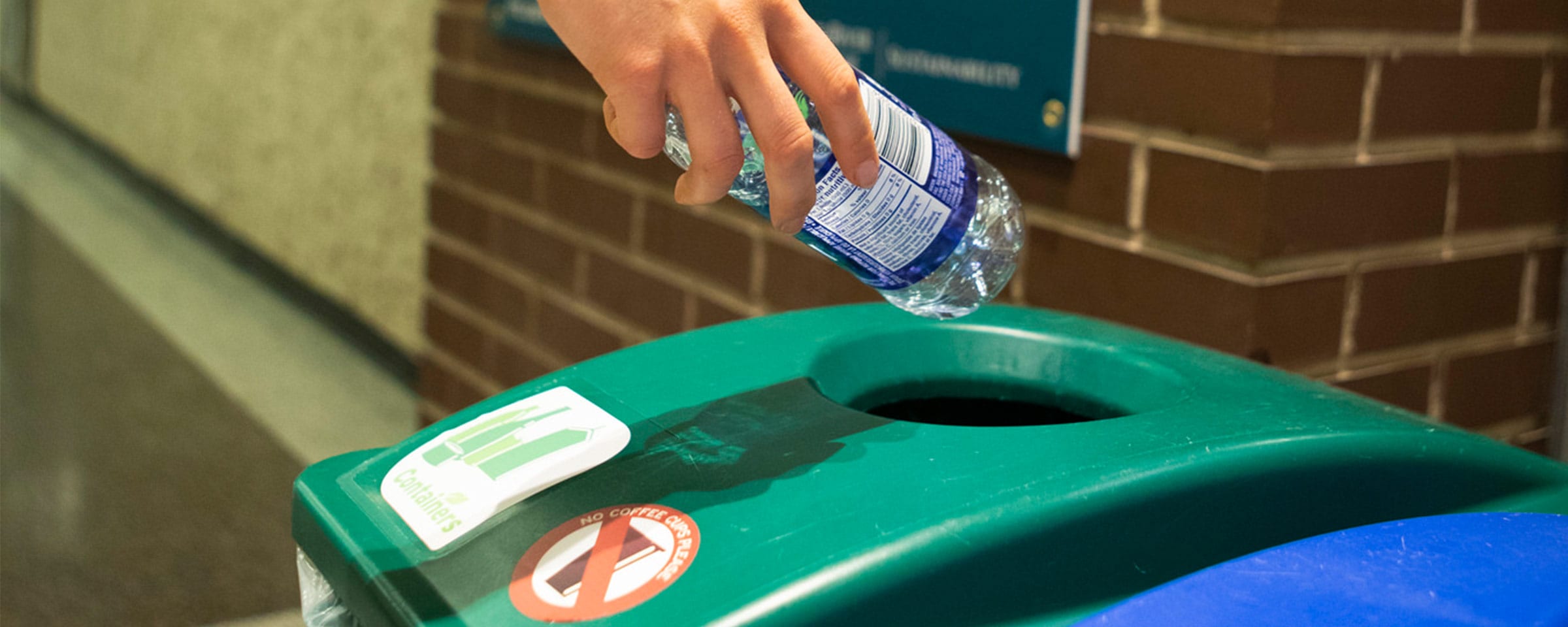


With more than 20,000 students and 1,500 staff, we use and discard large quantities and various materials across all our campuses. Our team is here to make sure waste reduction and diversion is as efficient and effective as possible. Successfully reducing waste on campus requires smart design, easy access, and your help to make our program work.
The Pitch In program is designed to make recycling and discarding waste as easy as 1-2-3. Waste and recycling are now three bins found together in hallways and nicknamed trios. Each bin is labelled either Paper, Containers, or Landfill and complemented by a colorful sign that lets you know what goes where. This sets people up to make the right decision every time! This program was a finalist for the AASHE Sustainability Award 2017. Waste haulers and what they accept differ at campus locations, so signs may vary.
Containers. This bin is for items with the recycling symbol and corresponding number accepting everything but #6, glass, or coffee cups. Acceptable materials often consist of milk cartons, plastic bottles, and food tins.
Paper. This bin is for paper, boxboard (cereal & Kleenex boxes etc), books, magazines, and flyers (even glossy). We separate this stream from containers to ensure that our paper is uncontaminated, so it can live on for many more lives. We ask that all large cardboard boxes are flattened and slide behind the bins.
Landfill. The bin of last resort. Anything that can’t be diverted through Paper or Containers, like single-use coffee cups, goes here.
For the Hall it! program, we removed all garbage and recycling bins from classrooms and offices so that students and staff use the trios in the hallway.
This keeps classrooms and offices cleaner and leads to a more thoughtful disposal process.
When food waste goes into the landfill, food scraps ferment and emit large amounts of the dangerous greenhouse gas methane.
Composting properly manages this decomposition eliminating methane from producing. Waste such as fruit and veggie scraps, eggshells, coffee grounds, fish, meat and dairy are all collected through two different programs:
Pre-consumer composting is often prep waste and unserved leftovers from kitchens. Culinary Arts students and Food Services collect the waste that is then weighed by the Recycling Team and transported to an on-site compost pile managed by the Grounds Department. The finished compost is used to fertilize the College’s grounds and flower beds.
Here’s a look at our annual compost weights over the years:
| 2016 | 2017 | 2018 | |
|---|---|---|---|
| Annual Totals (kg) | 22,507 | 21,314 | 19,961 |
PGI Campus has both a pre and post-consumer composting program. Not only are food scraps gathered from kitchens, there is also a compost waste stream for customers. These bins are in the Annex and accept that last bite you just couldn’t finish, your napkins, wood stir sticks, and even your take-out container!
Thanks to you, Food Services, Culinary Arts kitchens, Culinary Exchange kitchen and cafeteria, and Jane’s restaurant, our compost weights continue to grow:
| 2016 | 2017 | 2018 | |
|---|---|---|---|
| Annual Totals (kg) | 73,300 | 61,290 | 64,780 |
Recycling your writing instruments such as pens, markers, highlighters and mechanical pencils, as well as small household batteries and plastic bags help divert waste from the landfill. All these items can be toxic to the environment. Here’s how you can help:
Our ReBins collect markers, pens, and pencils that then get sent to Staples Recycling Program, to be made into new recycled products like these here. Plastic bags can also be disposed here and go to Winnipeg Harvest’s Bag It Forward Program, supplying emergency food kits to over 64,000 Manitobans monthly.
Notre Dame Campus Locations:
Roblin Centre Locations:
You can keep batteries out of the landfill by putting them in battery bins. These boxes are intended to collect small, household batteries only. Unsure? Click here. Contact RRC Polytech Health & Safety for any industrial, non-household or damaged battery disposal.
RRC Polytech campuses are located on the lands of the Anishinaabeg, Ininiwak, Anishininwak, Dakota Oyate, and Denésuline, and the National Homeland of the Red River Métis.
We recognize and honour Treaty 3 Territory Shoal Lake 40 First Nation, the source of Winnipeg’s clean drinking water. In addition, we acknowledge Treaty Territories which provide us with access to electricity we use in both our personal and professional lives.